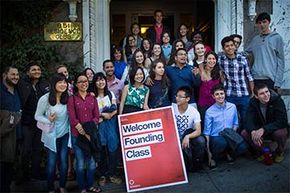In September 2014, a group of about 28 students from 14 countries became the first class ever to attend the Minerva Schools at KGI, a new four-year university experimenting with an entirely different approach to the traditional undergraduate experience. Lectures, entry-level classes and football stadiums are out; small, interactive online seminars are in. Rather than train students for a particular field or specialty, the Minerva Schools (Minerva, for short) seek to turn education on its head, trusting students to track down facts and general information on their own, and teaching them how to think critically, create and communicate across every academic discipline.
Minerva got its start in 2011 as the Minerva Project when CEO and founder Ben Nelson, a University of Pennsylvania graduate and the former CEO of Snapfish, decided to pursue his idea for a new university model. Nelson's goal was to do away with what he perceived as the failings and shortcomings of higher education, replacing impersonal old-school lectures with small, student-focused seminars conducted over an interactive online platform [sources: Minerva, Walker].
Advertisement
Minerva's backstory sounds in many ways more similar to an Internet start-up than an institution of higher learning. Based in San Francisco, Minerva was launched with a $25 million seed investment from the same venture capital firm that launched eBay and Twitter, and it will operate as a for-profit company [source: Kaminski]. Nelson hopes to eventually build a student body of between 7,000 and 10,000, although it's unclear how soon that might happen [sources: Kaminski, Walker].
Minerva bills itself as "a reinvented university experience for the brightest, most motivated students in the world," providing "an exceptional and accessible liberal arts and sciences education." The school is unapologetically selective. Nelson says that the school will accept all students that meet its admission criteria, but in its first year, Minerva received 2,464 applications from around the world and extended offers to just 69 students, giving the new university around a 2.8 percent acceptance rate (Harvard's was 5.8 percent in 2013) [sources: Minerva, U.S. News & World Report].
So how exactly does the Minerva Project work, and what makes it different from traditional colleges or online degree programs? Read on to find out!
Advertisement


